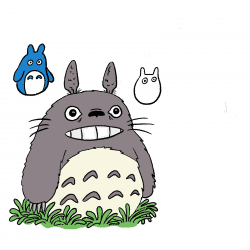It was Pokémon, Digimon and many other kid’s anime shows that were my gateway to finding what I would call the greatest animated movies I have seen since The Lion King 1½ — the work of Studio Ghibli. There’s no doubt that there are always underlying meanings to movies, and the Studio Ghibli films are no exception.
If you have seen the work of Studio Ghibli, then you know the glorious blessing that has been bestowed upon us all. If you have not, then as Shrek once said, “Join the club — we’ve got jackets.”
I spent time looking for the profound meanings behind these films so that I could make sense of my own fruitless life. I am here to convince you to consider my findings.
Ponyo, directed by Hayao Miyazaki, tore me up like the last few minutes of Marley & Me. Watching it for the first time, it seemed like an innocent movie about a boy named Sosuke who befriends a magical sea creature named Ponyo. After a storm develops, they go on a magical journey to find Sosuke’s mother.
Upon watching Ponyo a second time, I realized something. When one of the old ladies that Sosuke’s mother takes care of caught a glimpse of Ponyo — before she developed a humanoid figure — she thought it was a fish with a face and further said that such a fish would carry big waves with it if brought to shore.
This can be interpreted as a metaphorical foreshadowing for a tsunami, which Ponyo brought to the town, sinking it like the mythical city of Atlantis. The whole town was still intact though, because for the rest of the movie, they are no longer in the material world. From that moment, they are living in the afterlife.
This means that Ponyo, a creature that is half god, was guiding Sosuke across the water — which, in Japanese culture, is a symbol for crossing the river towards heaven. In other words, everyone has passed away.
I encourage you to watch this film with the afterlife in mind and discover what each of the characters, the places visited and the people that Ponyo and Sosuke meet really mean. After watching this film, I felt a mixture of emotions but mostly joy.
The second film, by Hayao Miyazaki and Kirk Wise, is called Spirited Away. This movie struck me as odd when I watched it for the first time, but there is a recurring theme that eventually hit me — hard.
In the film, a family wanders off into the land of the spirits, where they find a restaurant and begin eating spirit food that turns them into pigs. The daughter character, who did not partake in the food, then has to co-exist with the spirits while pondering an escape plan for herself and her family.
A singular theme in this movie is the importance of identity. For a brown boy growing up in another country, like me, this was huge. I grew up having trouble understanding my parents because their culture was different from the culture I was being raised in.
Identity explains who you are. Your identity has so much power that your mother can call you down from your room to eat dinner just by yelling your name. If we lose who we are, we become a spirit with no identity like the character No Face. I mean, this character literally does not have a face or any identifying features to signify its existence other than the fact that it wears a mask.
When you watch this movie, I recommend you seek to learn what your identity means to you. How does this affect your everyday life? Who are you to others? Or you can ponder what it would mean if we did not have faces and just took on the identities of those who we let influence us. Watch it with that in mind, and let your imagination wander.
—
J.C. Balicanta Narag / Outreach Director
Graphic: Jayme Stachyruk / Graphics Editor
Leave a Reply